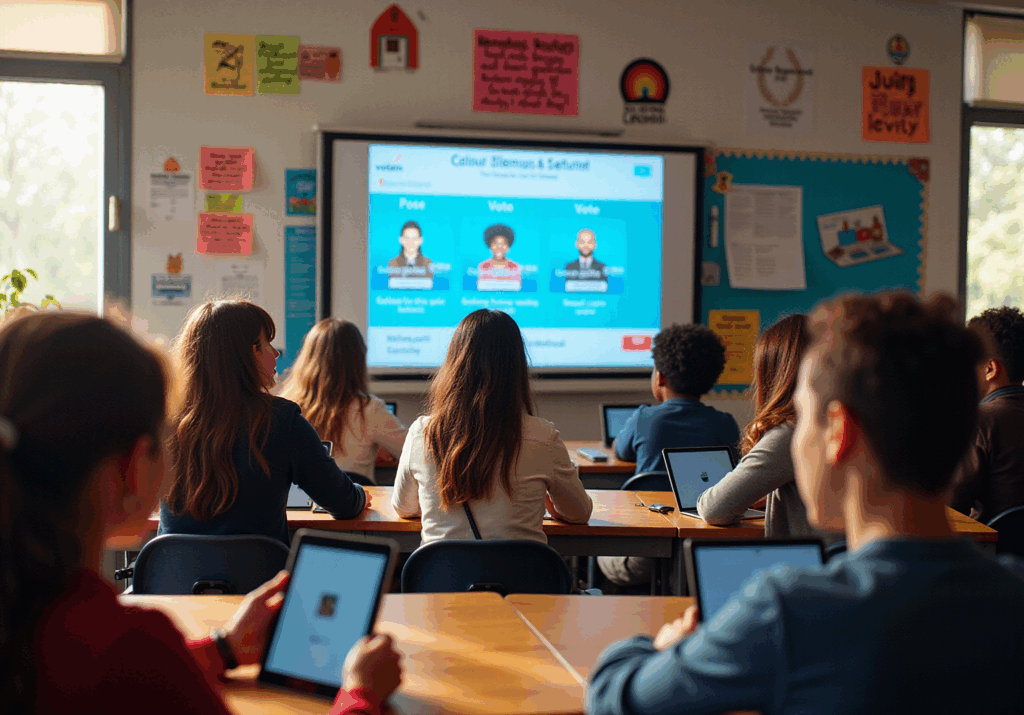Overview
The article centers on innovative voting strategies designed to enhance student participation in the electoral process. It underscores the impact of creative solutions, such as secure online voting platforms and mock elections, which have proven effective in significantly boosting student engagement. These approaches not only increase participation but also cultivate a sense of civic responsibility among young voters.
Furthermore, the implementation of these strategies can lead to a more informed and active electorate. By integrating technology and experiential learning, students are more likely to feel connected to the electoral process, fostering a culture of involvement. The article illustrates that when students are engaged through innovative methods, they are more inclined to take part in real elections, thus shaping the future of democracy.
In addition, the article highlights the importance of establishing a supportive environment that encourages students to voice their opinions and participate in discussions about civic issues. This can be achieved through partnerships with educational institutions and community organizations, creating a network that empowers young voters.
Ultimately, the article calls on union leadership to advocate for these engaging voting ideas, recognizing the challenges but emphasizing the potential for transformative change. By adopting these innovative approaches, we can inspire a new generation of voters who are not only prepared to participate but are also motivated to make their voices heard.
Introduction
The landscape of civic engagement is undergoing a significant transformation, as educational institutions increasingly acknowledge their crucial role in cultivating a culture of participation among students. As these young individuals prepare to embrace their responsibilities as informed citizens, innovative voting strategies are surfacing to enhance their involvement in the democratic process. However, a pressing question arises: how can schools effectively inspire students to not only grasp the significance of their vote but also actively engage in elections? This article delves into ten compelling strategies aimed at elevating student voting participation, ensuring that their voices resonate and are valued in shaping the future.
Votem: Secure Online Voting Platform for Student Engagement
Votem’s CastIron platform offers a secure online voting solution tailored for educational institutions. By adopting this platform, schools can implement voting ideas for students with fairness and transparency, fostering a culture of civic engagement among learners. The mobile-first design of CastIron provides effective voting ideas for students, enabling them to vote conveniently from any device and significantly boosting participation rates. For example, schools that transitioned to online ballots reported increased engagement, with some experiencing turnout rates up to three times higher on launch day. This trend signifies a broader movement towards integrating technology in academic contests, which includes innovative voting ideas for students to make the balloting process more accessible and efficient.
Votem’s innovative approach has garnered recognition, as noted by the New Mexico State Republican Party, which praised the effectiveness of Votem’s software and plans to utilize it again for future votes. Additionally, the platform’s robust security features, including 256-bit encryption, ensure that each vote remains protected, further enhancing trust in the electoral process. As educational institutions continue to embrace these advancements, Votem establishes itself as a pioneer in providing innovative voting ideas for students through secure and engaging ballot experiences.
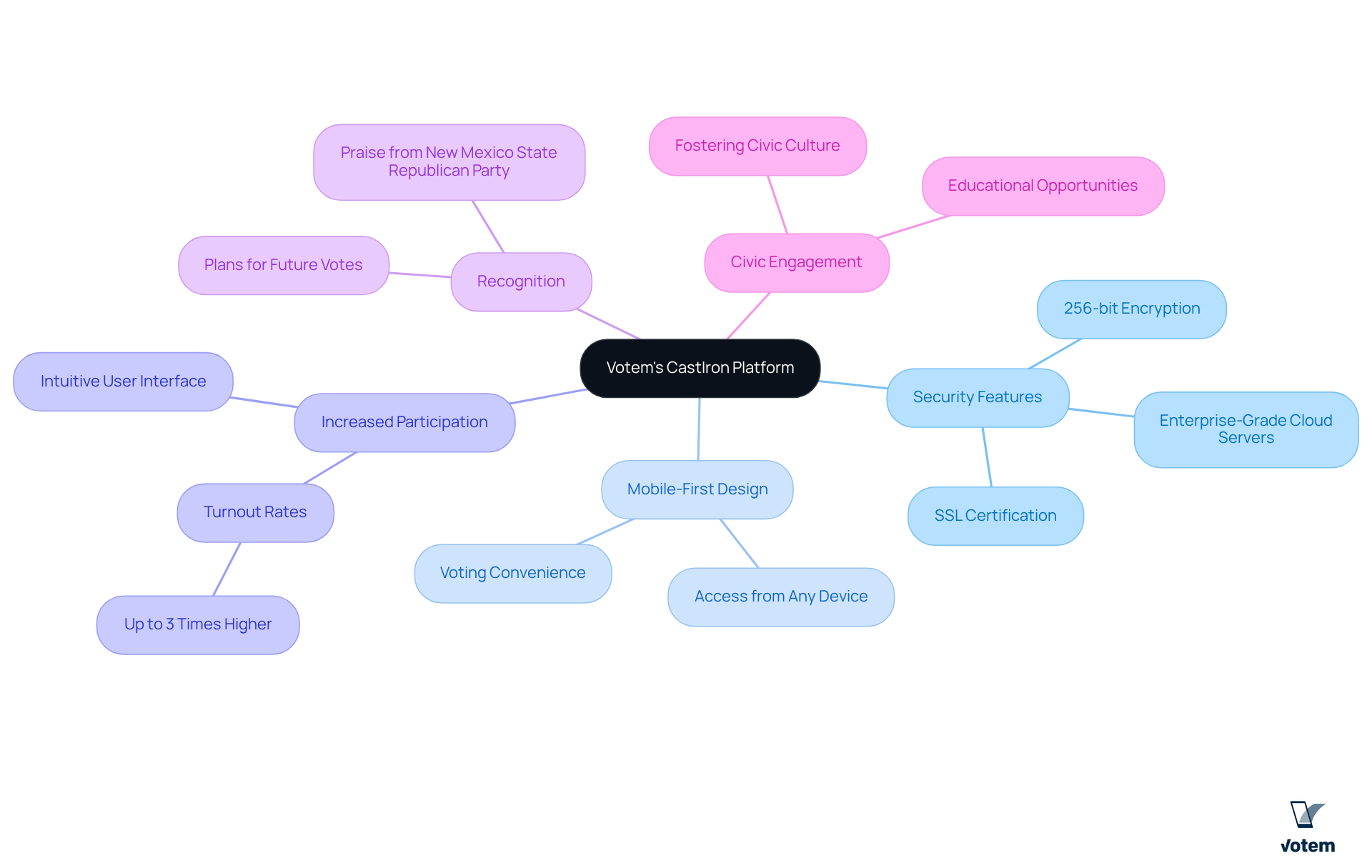
Hold a Mock Election: Simulate Real Voting Experiences
Arranging a simulated poll offers learners a practical opportunity to explore voting ideas for students, from promoting candidates to casting their votes via Votem’s secure platform. This immersive experience not only educates participants about the mechanics of voting but also includes voting ideas for students, nurturing a sense of civic responsibility.
For instance, in Maine’s recent simulated vote, over 140 schools participated, with approximately 50% of individuals casting their votes, showcasing strong involvement in civic activities. Furthermore, the 2025 Mock Election in Nevada has evolved into an annual initiative, underscoring the growing significance of voting ideas for students in enhancing civic engagement among learners.
At Mt. Ararat High School, volunteer learners expressed enthusiasm and empowerment from their participation in the mock vote, illustrating the positive outcomes of these initiatives. As Emma Humphries, chief education officer of iCivics, states, ‘Election education is more effective when learners can grapple with real candidates and issues.’
By simulating real electoral scenarios, mock elections empower students to recognize the importance of their votes and the broader impact of their participation, ultimately fostering a culture of civic engagement through various voting ideas for students that can endure a lifetime.
Votem’s innovative online voting solutions have proven effective in improving accessibility for all eligible participants, as evidenced by testimonials from satisfied clients. For example, one client remarked, ‘Implementing Votem’s new, modern system which allowed greater access for all qualified participants from military personnel to individuals with disabilities was my greatest achievement in office.’
Union leadership is encouraged to implement or support mock elections in their communities as part of voting ideas for students to enhance civic education and participation among young voters.
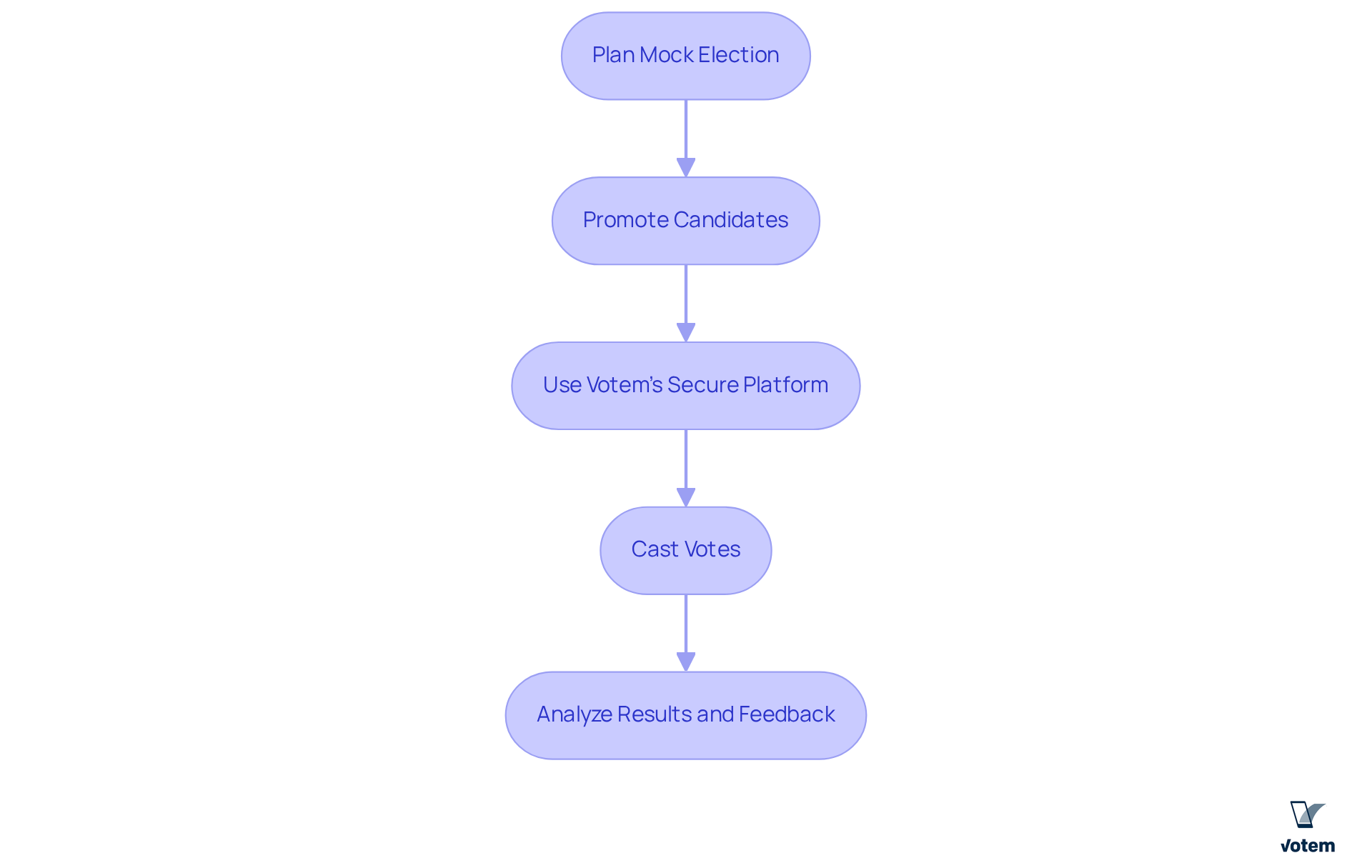
Research Political Party Platforms: Explore Diverse Perspectives
Encourage learners to actively explore the platforms of different political parties to grasp their positions on critical issues. This exploration can be effectively facilitated through engaging classroom discussions or comprehensive online resources. By examining a variety of perspectives, learners will gain a deeper understanding of the complexities of political ideologies and how these ideologies resonate with their own values and beliefs. Furthermore, this exploration not only broadens their knowledge but also fosters informed decision-making in their civic engagement.
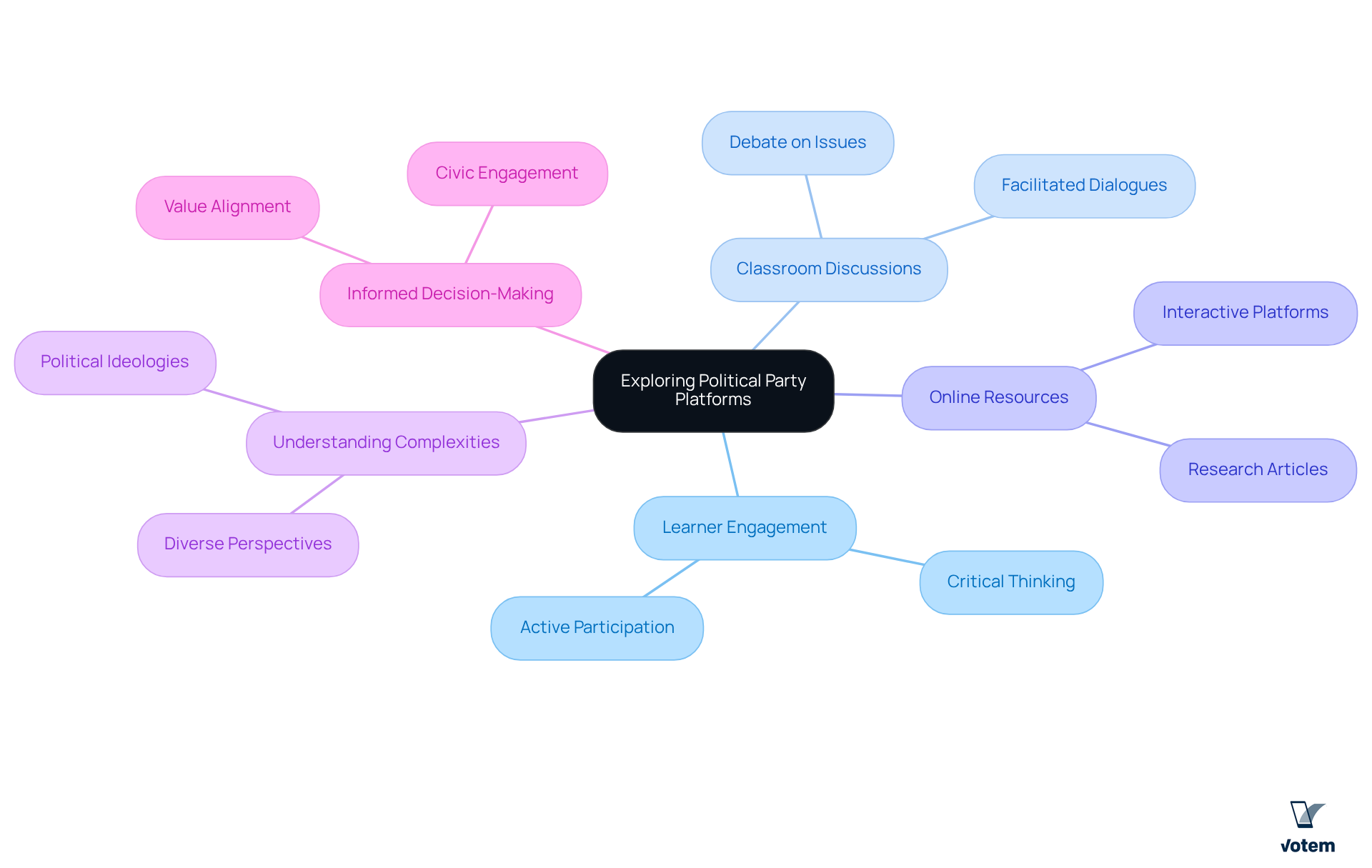
Connect with Your Local Elections Office: Learn About Local Governance
Motivating learners to engage with their local electoral office is essential for promoting comprehension of the ballot process and community management. By participating in activities such as attending informational sessions or volunteering for voting-related initiatives, individuals not only gain knowledge about forthcoming polls but also enhance their understanding of civic responsibilities. Research indicates that education about local governance significantly influences electoral behavior; students who receive voting ideas for students about their local electoral processes are more likely to participate in elections. This engagement fosters a sense of responsibility and empowerment, ultimately resulting in increased participation among young citizens. As Yeaji Kim observes, “As individuals gain more knowledge, they are more inclined to engage in elections,” emphasizing the vital importance of education in boosting civic involvement.
Furthermore, with participation levels for school board elections frequently fluctuating between only 5 to 10 percent, it is crucial for students to engage actively in democracy by understanding voting ideas for students related to the complexities of local governance. Votem’s innovative online ballot solutions have significantly improved accessibility, allowing greater participation from diverse groups of electors, including military personnel and individuals with disabilities. For instance, Votem successfully managed the receipt of 299,000 votes for the National Radio Hall of Fame, showcasing a substantial rise in participant engagement. The positive impact of absolute education on electoral participation has risen since 2000, highlighting the significance of local governance education in shaping voting behavior.
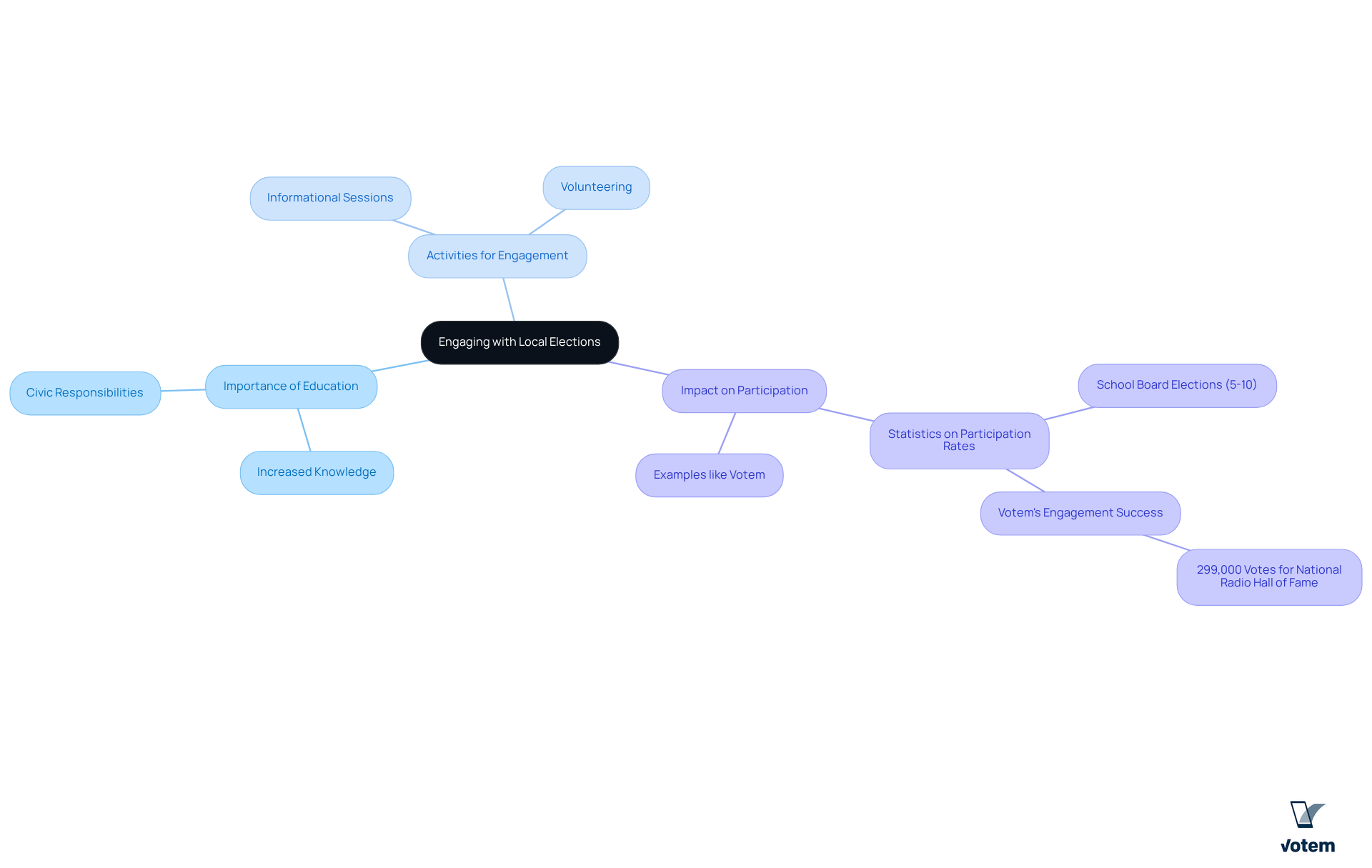
Investigate Ballot Propositions: Understand Key Issues
Students must actively engage in researching the ballot propositions that will appear on their ballots. This critical process involves examining the implications of each measure and discussing them in educational settings.
With 39% of adults having completed high school or less, it is imperative for young participants to bridge the literacy gap that often exists in ballot language, where 74% of propositions are written above a high school reading level. A readability study of U.S. ballot propositions revealed that only 3% fell within the reading ability of adults, underscoring the urgent need for educational initiatives that empower voters.
As Debbie Cochrane, Executive Vice President for The Institute for College Access & Success, states, “Enhancing educational achievement in California is not only a moral obligation, but also an economic necessity for both the individuals who stand to benefit from quality, affordable higher educational opportunity as well as for the state as a whole.”
By investigating these measures, learners can deepen their comprehension and explore voting ideas for students, ultimately contributing to a more informed electorate and fostering a culture of civic engagement and responsibility.
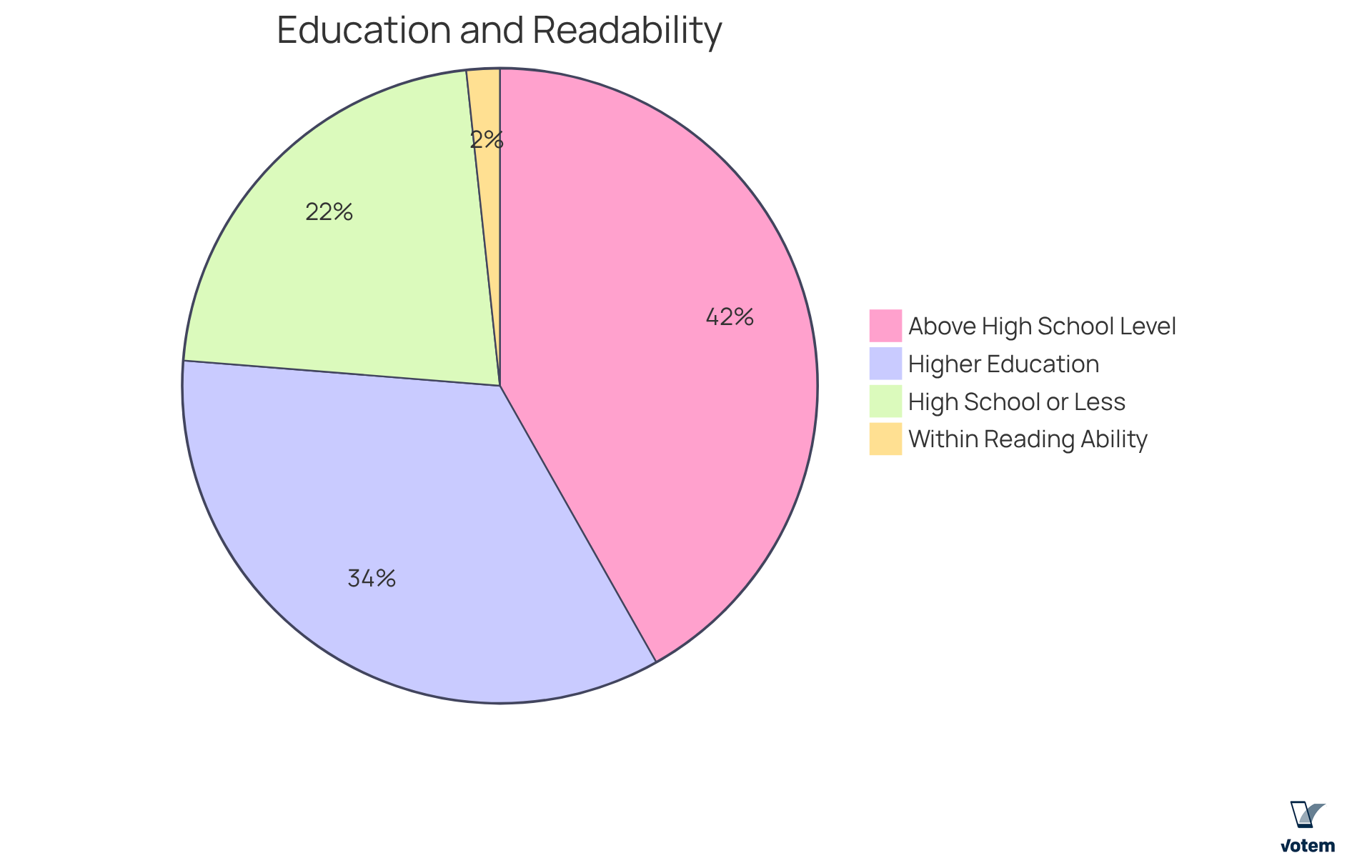
Compare the Candidates: Evaluate Qualifications and Policies
Motivating learners to evaluate candidates competing for office is essential for fostering informed electoral choices and promoting voting ideas for students. By assessing qualifications, past performance, and policy proposals, individuals can engage in meaningful research projects or discussions. This process not only enables them to articulate their views but also underscores the significance of their choices in shaping governance.
Studies indicate that learners who actively participate in candidate comparison projects are more likely to exhibit electoral behavior later in life. For instance, youth who received instruction on voting procedures in high school were at least 10 percentage points more likely to seek information on how to vote by mail. Furthermore, understanding candidates’ stances on critical issues—such as inflation, healthcare, and civil rights—empowers learners to make informed choices that resonate with their values and priorities.
As Sarah Andes observes, the experiences of young individuals being instructed and motivated to vote in high school are significant, with the potential to influence outcomes in various ways. By integrating these evaluation practices into educational settings, educators can notably enhance students’ civic engagement through voting ideas for students, ensuring they are well-prepared to participate in elections.
It is vital to recognize that encouragement to engage in elections during high school varies by race, highlighting the necessity for equitable access to electoral education. By addressing these disparities, we can cultivate a more inclusive environment for civic participation.
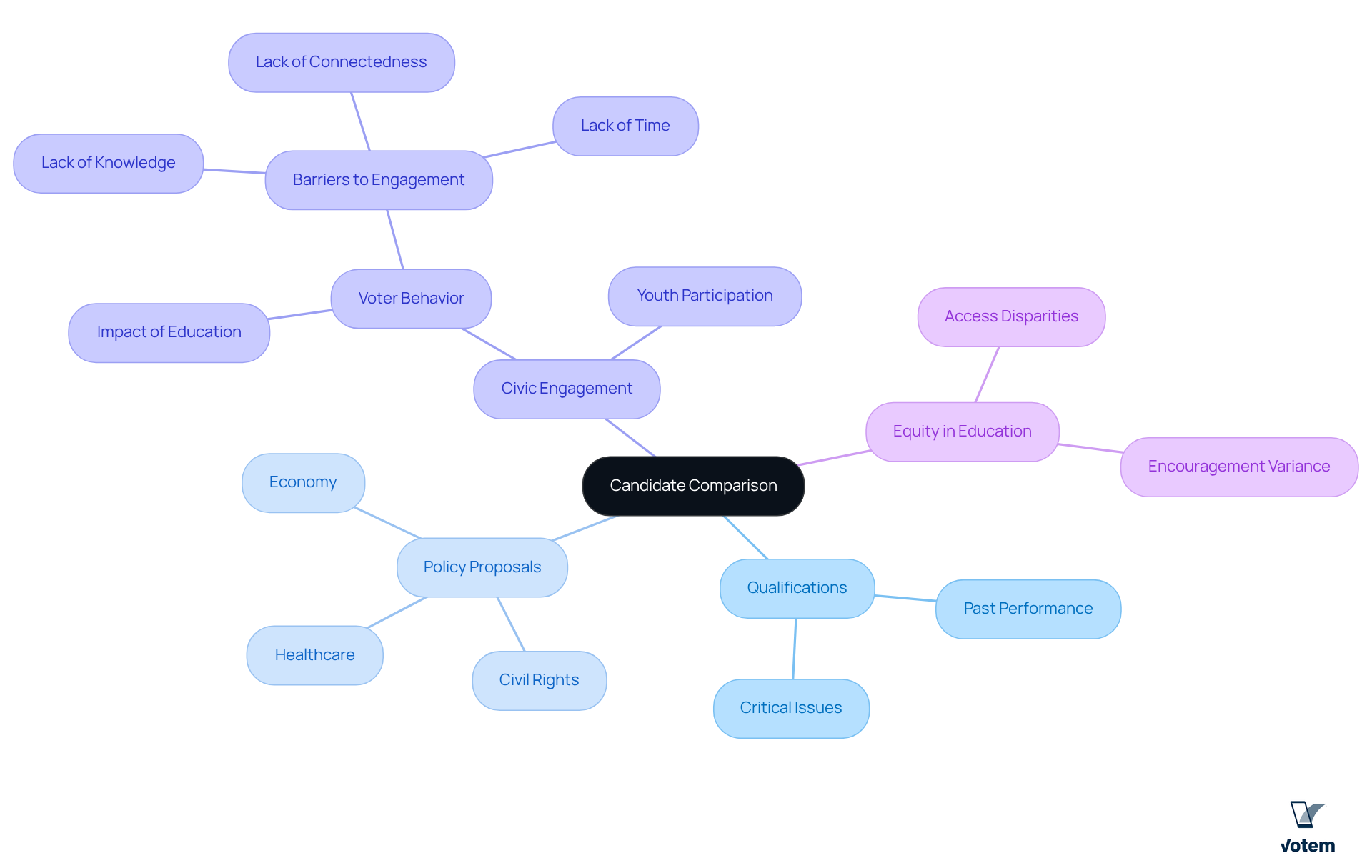
Utilize Remote Resources: Enhance Learning About Voting
Students can utilize a range of online tools, including webinars, podcasts, and educational websites, to enhance their comprehension of voting ideas for students and the significance of the electoral process. These platforms not only provide valuable insights into the electoral system but also empower learners to engage confidently in elections.
For instance, educational webinars in 2025 are designed to clarify the voting process and introduce voting ideas for students, covering essential topics such as registration, polling locations, and the importance of civic engagement.
Research indicates that interactive formats like webinars and podcasts significantly improve learners’ understanding of electoral issues, providing valuable voting ideas for students and increasing their likelihood of participating in the democratic process.
Furthermore, these tools have proven effective in reaching diverse audiences, ensuring that young voters are well-informed and prepared to make their voices heard.
By leveraging these remote learning tools, learners can cultivate a sense of civic duty and actively engage in their communities through informed choices.
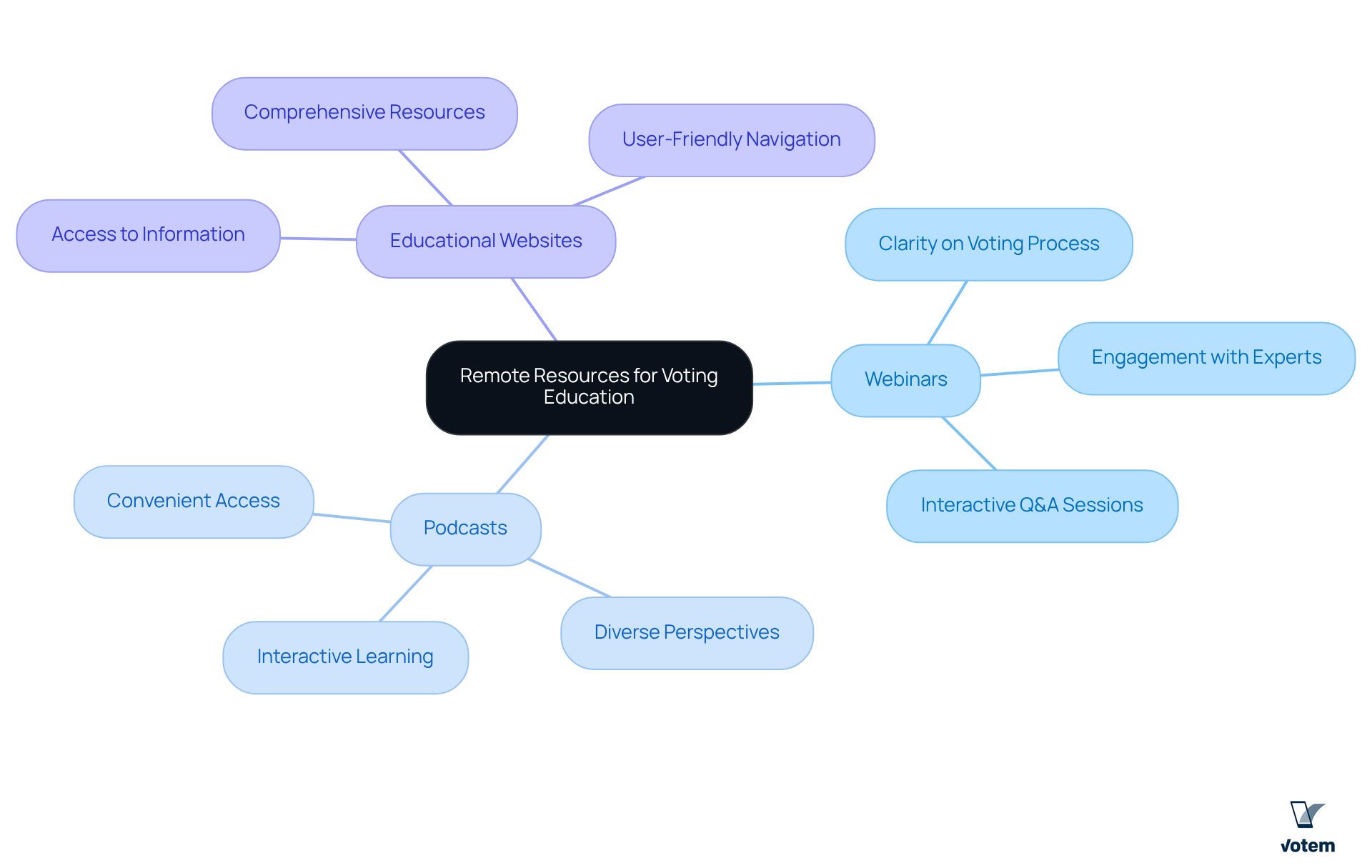
Teach the History of Voting Rights: Contextualize Current Elections
Integrating lessons on the history of electoral rights into the curriculum provides learners with a profound understanding of the challenges faced by various groups in their quest for participation. This historical context not only enriches their knowledge but also fosters a deeper appreciation for their voting rights. Recognizing the significance of their involvement is crucial in shaping a better future. By engaging with this material, learners are motivated to take action and ensure their voices are heard in the democratic process.
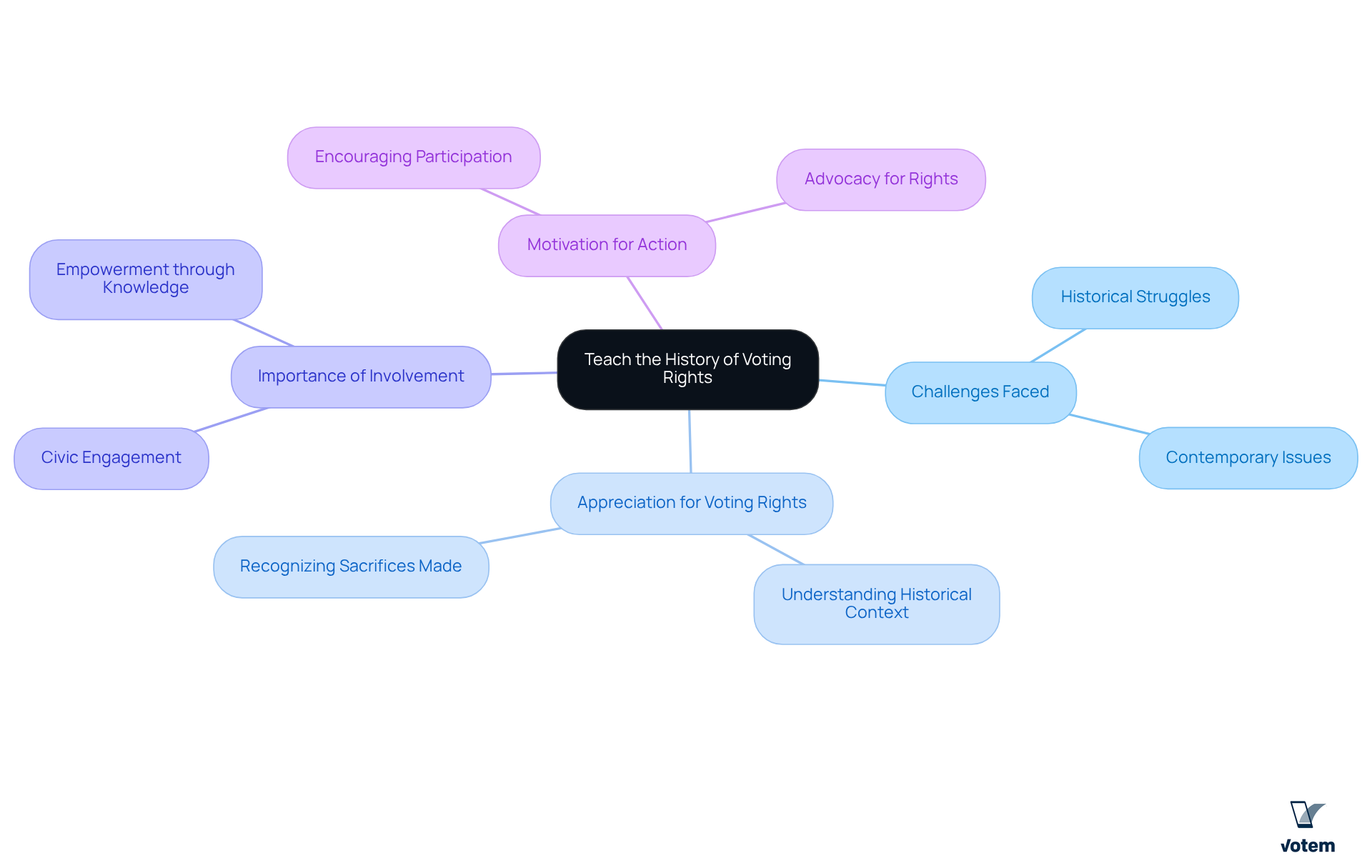
Recreate a Political Debate: Engage with Electoral Issues
Arranging a political debate in the classroom serves as an effective strategy for learners to explore voting ideas for students and engage with electoral issues. By assigning roles such as candidates or moderators, students can practice articulating their positions and responding to counterarguments. This interactive format not only fosters critical thinking but also deepens their understanding of the electoral process.
Research indicates that classroom debates significantly enhance learners’ grasp of political concepts; studies show that participants demonstrate improved analytical skills and a greater awareness of current events. Furthermore, engaging in discussions cultivates a sense of civic duty, motivating individuals to become informed voters.
As John F. Kennedy once stated, ‘We can no longer afford to be second best,’ emphasizing the necessity of active participation in democracy. The evolution of presidential debates, which now encompass a variety of issues and reach national and international audiences, further underscores the significance of these discussions.
By integrating debates into the curriculum, educators can provide voting ideas for students, empowering them to navigate electoral issues with confidence and insight.
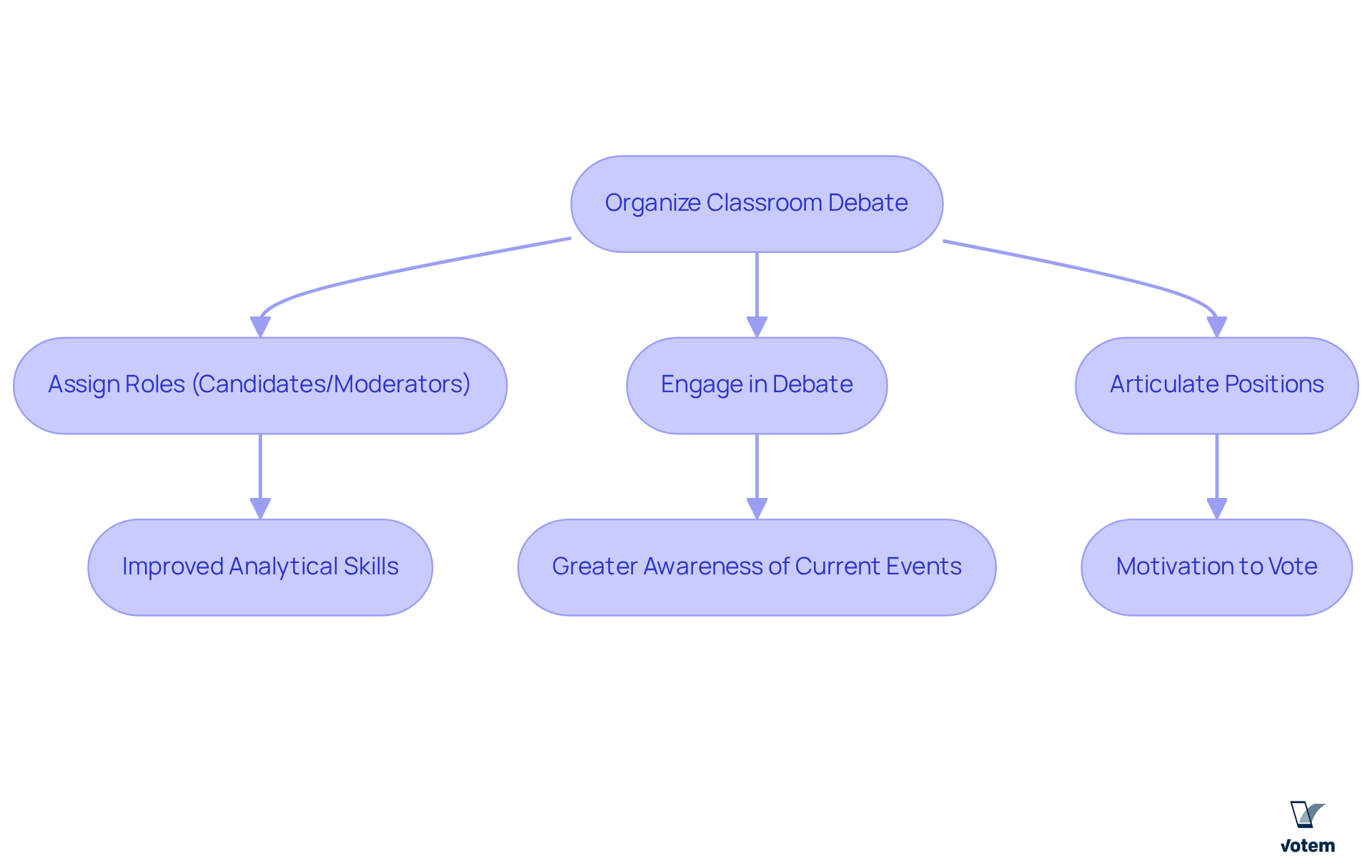
Discover Why Your Vote is Important: Empower Student Participation
Encouraging students to reflect on the significance of their vote is crucial for fostering civic engagement by discussing voting ideas for students. Discussions should focus on how voting ideas for students influence both local and national issues, demonstrating that each vote can drive meaningful change.
For instance, in communities where registration drives were implemented, there was a notable rise in enrollment rates among 18-year-olds, highlighting the success of proactive involvement. When learners understand the influence of their vote, they are more inclined to engage actively in elections and promote voting ideas for students that resonate with them. This empowerment is vital, especially considering that over 60 million Americans remain unregistered, with a substantial segment being young individuals aged 18 to 24. By fostering an environment that emphasizes the importance of participation in elections, we can motivate students to understand their role in shaping democracy and encourage them to consider voting ideas for students.
Votem’s innovative online ballot solutions have shown significant improvement in accessibility for all eligible participants, including military personnel and individuals with disabilities. Linda McCulloch emphasized the system’s capability to enhance access for those casting ballots. Furthermore, Votem’s effective management of 299,000 ballots for the National Radio Hall of Fame illustrates how contemporary electoral solutions can greatly enhance participation.
To further engage, students can:
- Participate in local voter registration drives
- Advocate for voting ideas for students that enhance voting accessibility
This ensures their voices are heard in the democratic process.
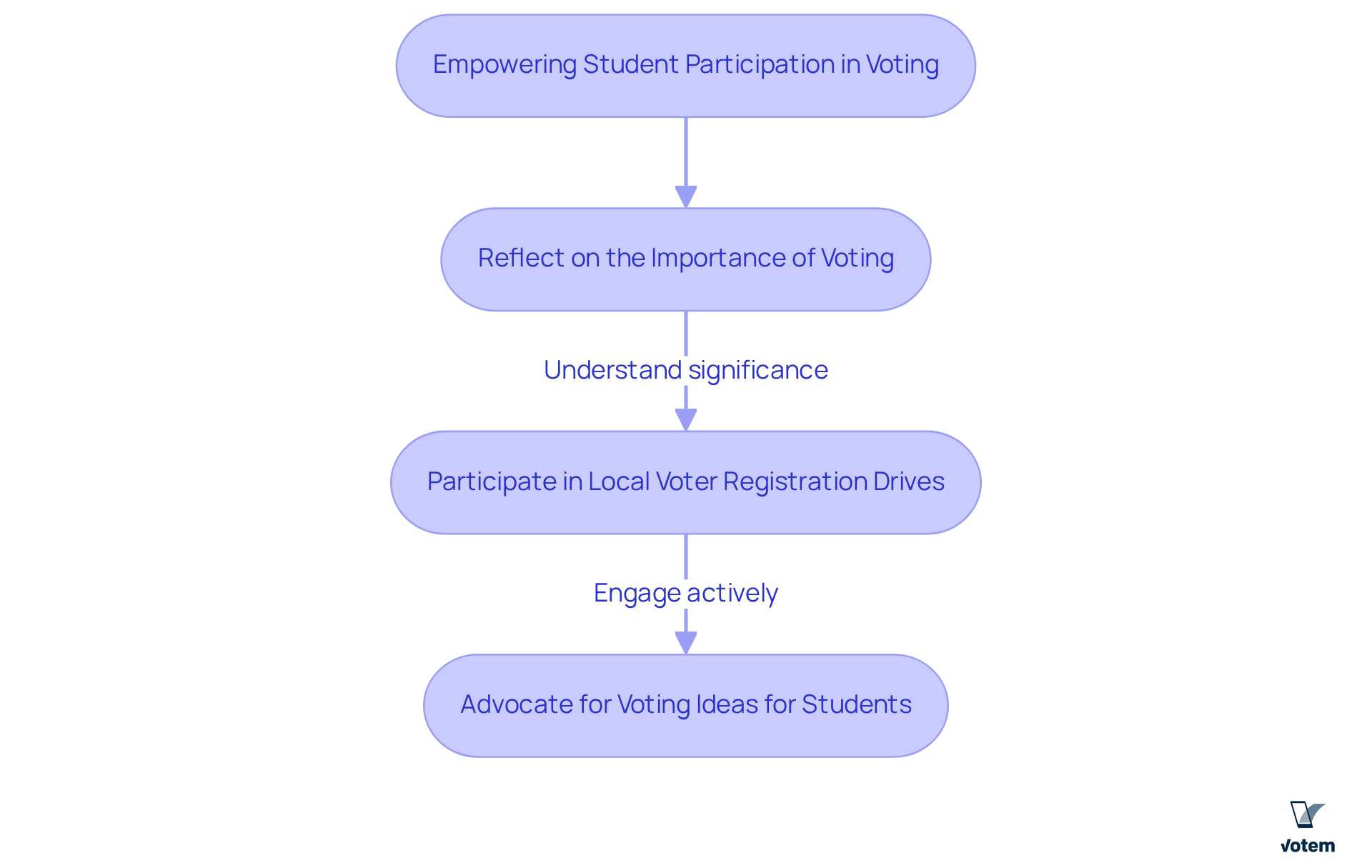
Conclusion
Engaging students in the voting process is essential for fostering a culture of civic responsibility and participation. By implementing innovative voting ideas tailored for educational settings—such as secure online platforms like Votem, mock elections, and interactive learning experiences—educational institutions can significantly boost student engagement and understanding of the electoral process.
Throughout this discussion, various strategies have been highlighted to encourage student participation. From utilizing technology for secure online voting to organizing mock elections that simulate real-world voting experiences, each approach emphasizes the importance of making the electoral process accessible and relatable. Furthermore, fostering discussions around political party platforms, local governance, and ballot propositions equips students with the knowledge necessary to make informed decisions. Engaging with remote resources further enhances their understanding of voting, while teaching the history of voting rights contextualizes their participation in the democratic process.
Ultimately, empowering students to recognize the significance of their votes is crucial for shaping a more engaged and informed electorate. By actively participating in local voter registration drives and advocating for accessible voting ideas, students can make their voices heard and contribute to the democratic process. The commitment to enhancing civic education and participation among young voters is not merely a responsibility; it is an investment in the future of democracy itself.
Frequently Asked Questions
What is Votem’s CastIron platform?
Votem’s CastIron platform is a secure online voting solution designed specifically for educational institutions, enabling schools to implement voting ideas for students with fairness and transparency.
How does CastIron enhance student participation in voting?
The mobile-first design of CastIron allows students to vote conveniently from any device, significantly boosting participation rates. Schools that switched to online ballots reported turnout rates up to three times higher on launch day.
What security features does Votem’s platform offer?
Votem’s platform includes robust security features such as 256-bit encryption, ensuring that each vote is protected and enhancing trust in the electoral process.
How can mock elections benefit students?
Mock elections provide students with practical experiences in voting, from promoting candidates to casting votes. This immersive experience educates participants about the voting process and nurtures a sense of civic responsibility.
What was the outcome of Maine’s recent simulated vote?
In Maine’s recent simulated vote, over 140 schools participated, with approximately 50% of individuals casting their votes, demonstrating strong involvement in civic activities.
What is the significance of the 2025 Mock Election in Nevada?
The 2025 Mock Election in Nevada has become an annual initiative, highlighting the growing importance of voting ideas for students in enhancing civic engagement.
How do mock elections empower students?
By simulating real electoral scenarios, mock elections help students recognize the importance of their votes and the broader impact of their participation, fostering a lasting culture of civic engagement.
How can union leadership support civic education?
Union leadership is encouraged to implement or support mock elections in their communities as part of voting ideas for students to enhance civic education and participation among young voters.
Why is exploring political party platforms important for students?
Exploring political party platforms helps students understand different perspectives on critical issues, fostering informed decision-making and a deeper understanding of political ideologies that resonate with their values and beliefs.
List of Sources
- Votem: Secure Online Voting Platform for Student Engagement
- Online Voting & Election Software for Schools – Voting 4 Schools (https://voting4schools.com)
- High School Voter Education Week to engage students in democratic process (https://newsroom.ocde.us/high-school-voter-education-week-to-engage-students-in-democratic-process)
- Hold a Mock Election: Simulate Real Voting Experiences
- Nevada launches annual student mock election to boost civic education (https://news3lv.com/news/local/nevada-launches-annual-student-mock-election-to-boost-civic-education)
- Mock Elections in Schools Evolve to Build Trust in Democracy (https://edweek.org/teaching-learning/mock-elections-in-schools-evolve-to-build-trust-in-democracy/2024/10)
- Over 140 Maine schools participated in mock election that went handily to Trump • Maine Morning Star (https://mainemorningstar.com/2024/10/30/over-140-maine-schools-participated-in-mock-election-that-went-handily-to-trump)
- Tomorrow’s Voters in Training: 2025 Student Mock Election Now Open | WA Secretary of State (https://sos.wa.gov/about-office/news/2025/tomorrows-voters-training-2025-student-mock-election-now-open)
- Connect with Your Local Elections Office: Learn About Local Governance
- The Civic Value of Education: How Scholastic Experiences Create Active Citizens – Samuel V. Stoddard, 2023 (https://journals.sagepub.com/doi/10.1177/1532673X221144053)
- Absolutely Relative: How Education Shapes Voter Turnout in the United States – PMC (https://pmc.ncbi.nlm.nih.gov/articles/PMC10225039)
- Visualizing Voter Turnout in Local and School Board Elections | Voting | Carnegie Corporation of New York (https://carnegie.org/our-work/article/visualizing-voter-turnout-local-school-board-elections)
- Investigate Ballot Propositions: Understand Key Issues
- Low Literacy Levels Among U.S. Adults and Difficult Ballot Propositions – Rebecca L. Parker, 2024 (https://journals.sagepub.com/doi/10.1177/00222194241249958)
- Five ballot propositions that would affect students (https://calmatters.org/education/higher-education/college-beat/2020/10/five-ballot-propositions-students)
- Survey Results (https://campusvoteproject.org/survey-results)
- Results for education and school choice ballot measures, 2024 (https://ballotpedia.org/Results_for_education_and_school_choice_ballot_measures,_2024)
- Compare the Candidates: Evaluate Qualifications and Policies
- Get Out the Vote: Cultivating Civic Engagement in Youth and Adults (https://aamchealthjustice.org/news/polling/get-out-vote)
- Youth Who Learned about Voting in High School More Likely to Become Informed and Engaged Voters (https://circle.tufts.edu/latest-research/youth-who-learned-about-voting-high-school-more-likely-become-informed-and-engaged)
- Utilize Remote Resources: Enhance Learning About Voting
- My Voice, My Voter’s Guide (https://learningforjustice.org/classroom-resources/student-tasks/do-something/my-voice-my-voters-guide)
- WEBINARS | Our Homes, Our Votes (https://ourhomes-ourvotes.org/webinars-2024/webinar-archive)
- Vote Smart | Facts For All (https://votesmart.org)
- Resources for Teaching About Voting and Elections – CIVICS RENEWAL NETWORK (https://civicsrenewalnetwork.org/featured/resources-for-teaching-about-voting-and-elections)
- Teach the History of Voting Rights: Contextualize Current Elections
- Development for the People! (https://read.dukeupress.edu/books/book/3075/chapter/6581050/Development-for-the-People)
- 1: Implementing Ethnic Studies Courses- Who Decides? (https://socialsci.libretexts.org/Courses/California_State_University_Fullerton/Cases_in_California_Politics_and_Administration:_Centering_Equity_and_Social_Justice_Issues/01:_Case_Studies/1.01:_Implementing_Ethnic_Studies_Courses-_Who_Decides)
- Recreate a Political Debate: Engage with Electoral Issues
- Political group hosts debate on CSU’s campus following Charlie Kirk vigil, encouraging free speech and discourse (https://cbsnews.com/colorado/news/political-debate-csu-campus-following-charlie-kirk-vigil-free-speech-discourse)
- High school speech and debate allows students to find common ground (https://hechingerreport.org/high-school-students-find-common-ground-on-the-debate-stage)
- 11 Memorable Quotes from U.S. Presidential Debates | Britannica (https://britannica.com/list/11-memorable-quotes-from-us-presidential-debates)
- Charlie Kirk’s tour invited political debates on college campuses (https://abcnews.go.com/Politics/charlie-kirks-tour-invited-political-debates-college-campuses/story?id=125459212)
- Debate Quotes (385 quotes) (https://goodreads.com/quotes/tag/debate)
- Discover Why Your Vote is Important: Empower Student Participation
- Empowering Youth Voters: Invest in High School Registration (https://thecivicscenter.org/blog/empowering-youth-voter-registration)
- National Student Vote Summit – Students Learn Students Vote Coalition (https://slsvcoalition.org/national-student-vote-summit)
- No Kings Day: Empowering Youth Through Voter Action (https://thecivicscenter.org/blog/ohio-youth-voter-registration-race-2026-kkk82-xl9bx)
- LWV Announces Collaboration with AASA to Support Student Voters (https://aasa.org/news-media/news/2025/10/01/lwv-announces-collaboration-with-aasa-to-support-student-voters)

